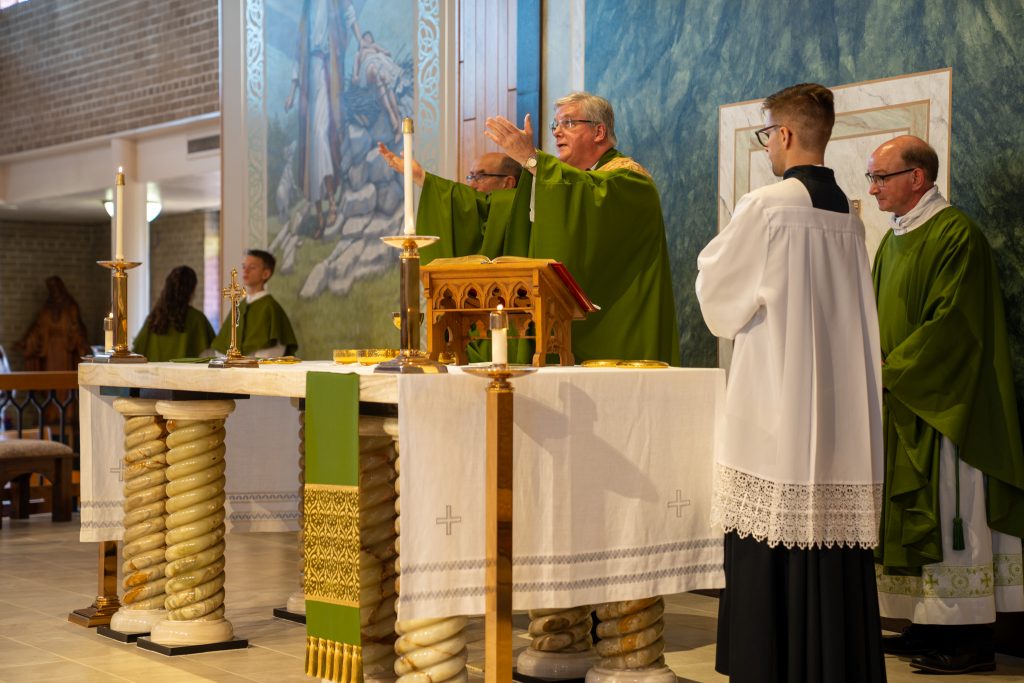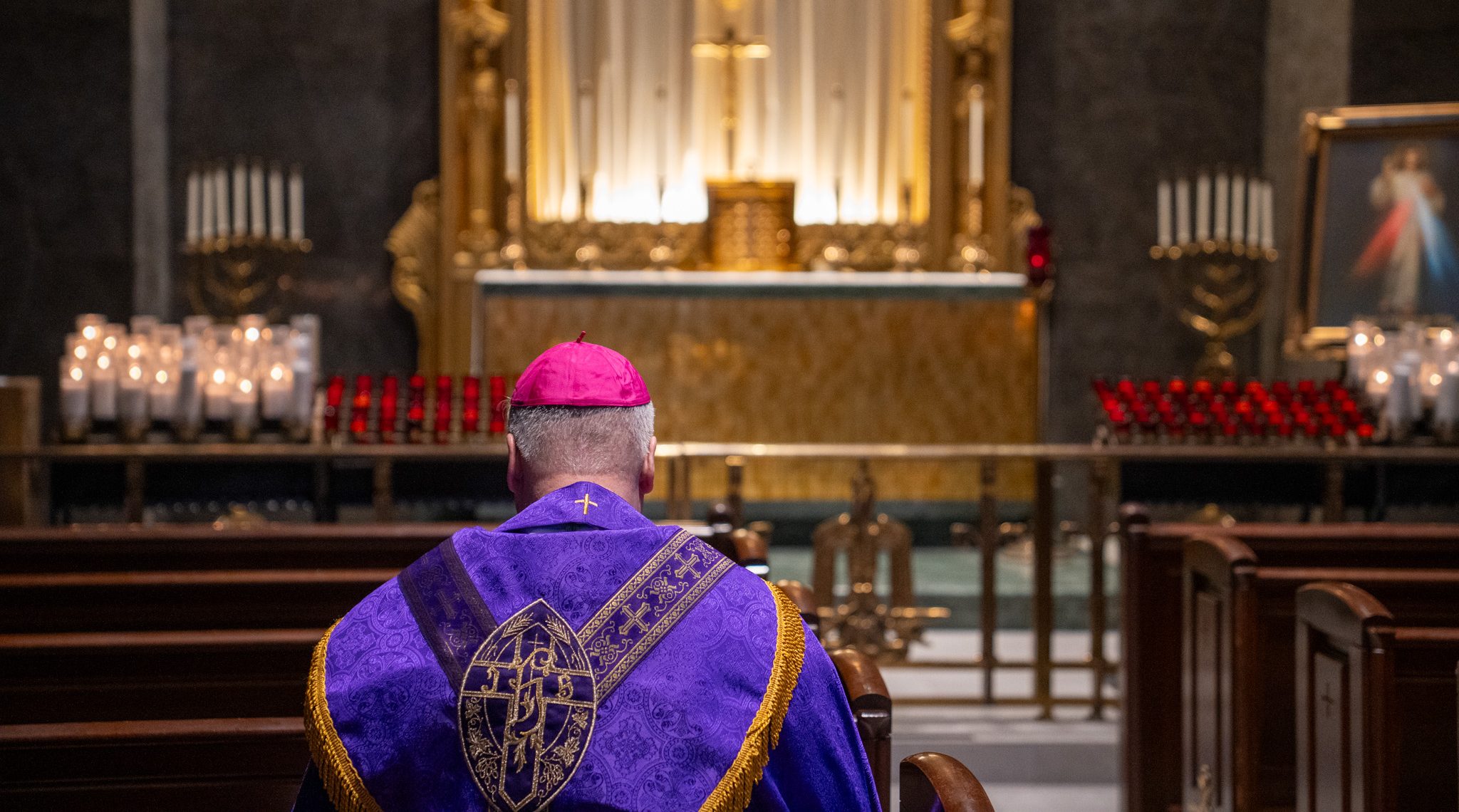Embracing our eucharistic identity
We can never say it enough: God is love. Before any other consideration, love is at the heart of Jesus’ mission, and in an incredible prodigy of mercy, He reveals to us the face of the Father. As stated in John’s Gospel, “God is love, and whoever remains in love remains in God and God in him.” (1 Jn 4:16) Too often, we take these words lightly. However, the truth is that, as Pope St. John Paul II taught by quoting the Fathers of the Second Vatican Council, our entire lives can only be understood through the mystery of Christ, which in turn reveals the mystery of man.
From time to time, I download songs on my laptop and take a walk down memory lane. St. Patrick’s Day was the latest occasion for this. I enjoy a variety of musical genres, and there seems to be an endless array of options on the internet available for our consumption. Recently, I stumbled upon a song called “Leader of the Band” by Dan Fogelberg. There’s a line in the refrain that goes, “I’m just a living legacy of the leader of the band.” It reminds me of my dad, and so I listen to it occasionally, hearing in the words a “thundering velvet hand,” his own way of sculpting souls.
Becoming Eucharistic People
Without trying to be too flippant, the same can be said for a baptized soul. We are, with a wonder, fit for all the ages; we are living tabernacles of the Real Presence of Christ, who comes to us in the sacraments and makes His dwelling within us. We are more than a living legacy; we are being formed and transformed into a eucharistic people, built up into a structure of the baptized with Christ as the capstone—not made by human hands, but sculpted by the Holy Spirit.
My dear ones, even now we are being made like Jesus, if only we will suffer ourselves to being formed by the new pattern of re-creation, dying and rising in Christ. Christ is our identity.
Becoming Who We Receive
Do you ever think, and I hope you do, that you and Jesus are going out into the world, in a profound way, after Mass and Communion? You are to become His advance team and the one who, through an encounter with Him, will be formed in His ways. We are a wonder of re-creation, a living legacy of the Father’s plan. (cf. Eph 1:10)
Sometimes people’s humility will not tolerate such exalted talk, but I assure you that this intolerance is not true of the saints. They understood that Jesus desires to repeat His life in each of us. St. Paul expresses this beautifully: “…yet I live, no longer I, but Christ lives in me; insofar I now live in the flesh, I live by faith in the Son of God who has loved me and given himself up for me.” (Gal 2:20)

We are bearers of Christ, as was the Blessed Virgin Mary. We are witnesses and ambassadors of the one who has loved us first. We are the ones to whom Christ says: “Whoever wishes to come after me must deny himself, take up his cross, and follow me.” (Mt 16:24)
Sometimes I hear people say, “I don’t go to Mass because it’s boring,” or even worse, “I get more out of [insert activity] than Mass.” However, we don’t go to Mass to be entertained; we go to worship. We go because The Grand Physician has prescribed this remedy for us. By placing our eyes on Him and turning away from ourselves, we find the path to peace, timely aid and unhoped for mercy. (cf. Heb 4:16)
The Father’s Desire Is to Make Us Like Christ
Worship doesn’t change God; it changes us. That’s why the Father made it a commandment, not a suggestion. We go to worship the Father’s way, revealed and commanded by Jesus: “Do this in memory of me.” (Lk 22:19)
In baptism, we are no longer our own possession; we are Christ’s, members of His body. Our identity is a share, by grace, in Jesus’ identity—the identity He has by nature, which we wondrously possess by grace. Our identity is to take part in Jesus’ Paschal Mystery, through which He reconciled the world to the Father. We do this principally, though not exclusively, in the holy sacrifice of the altar. It is to participate in His salvific act of worship, offered in an unbloody manner—so that He, who has done everything, may receive glory from us. We add—small though it is—our own sacrifice to His. (cf. Col 1:24)
The moment of Communion is a mystical encounter with the crucified and risen Lord. We submit to Him in faith and allow Him to reign in us, possess us and flow through us into the world. Through the Mass, the Holy Spirit forms us into a eucharistic people—becoming, like Jesus, in Him, through Him and with Him, bread for the world.
Eucharistic Transformation
Eucharistic identity comes to us by grace in our encounter with the risen Christ. It comes to us as we receive Him in word and sacrament, as we receive Him in service of our neighbor, in living an imitative life of virtue and by allowing Christ to repeat His life and mission in us.
Eucharistic identity is the fruit of this encounter with Christ. It is acquired and appropriated, so that in our flesh, we become whom we receive through Christ’s death and resurrection. To possess eucharistic identity is to become, in an absolute way, a eucharistic missionary—one who is sent to announce the Good News and bring salvation to the poor. Eucharistic identity inexorably leads to eucharistic mission. (cf. Lk 4:14)
Indeed, in “For the Life of the World: Invited to Eucharistic Mission,” Bishop Andrew Cozzens shares that, “A Eucharistic missionary lives the essence of the Eucharistic mystery through encountering Jesus’ presence, living Jesus’ communion, and making a gift of his life through Jesus’ sacrifice.”
The Father desires to see in us what He sees in His Son, Jesus. Pope Francis beautifully expressed this in a general audience in 2017 when he noted that the words “taken, blessed, broken and given” describe the Eucharist, what happened to Jesus and to describe you and me. (Ibid., 14)
My brothers and sisters, it is truly Good News that God wants to save us through His Son, Jesus. Not only does He desire to make us co-heirs with Him, but He even wants to transform us into His very likeness.
No one can fully imagine the incomparable gift God places before us. What kind of love does He have, that casting off His glory and humbling Himself for our sake was not too much? And even more: He desires that we repeat that act—by His power in us—and be conformed to His person and mission.
The one thing He requires of us is that we make a choice for Him, just as He has made a choice for us. Once we make that election, He desires that we live from our new identity—becoming a people formed by encounter with Him, a eucharistic people, on a eucharistic mission.
By Most Reverend Gerard W. Battersby, Bishop of the Catholic Diocese of La Crosse
Published in the Summer 2025 issue of Catholic Life Magazine

